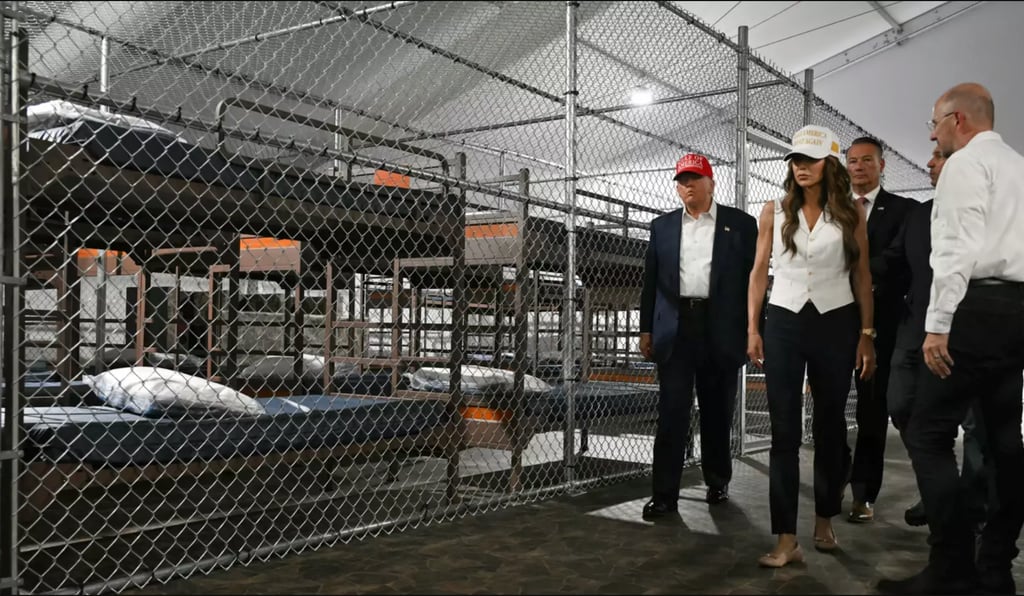Alligator Alcatraz: From Near-Closure to Controversial Revival in Florida's Everglades
9/25/20254 min read


Alligator Alcatraz: From Near-Closure to Controversial Revival in Florida's Everglades
In the sweltering heart of the Florida Everglades, where mangroves whisper secrets to the wind and alligators patrol the waterways like silent sentinels, a facility dubbed "Alligator Alcatraz" has become the epicenter of America's heated immigration debate. Built hastily in June 2025 on a disused airstrip at the Dade-Collier Training and Transition Airport, this state-run detention center for federal immigration detainees was meant to symbolize Florida's aggressive stance on border enforcement. But what started as a bold political statement nearly ended in environmental reckoning—only to roar back to life through a judicial twist that has activists crying foul and officials celebrating a win.
Imagine a tented camp ringed by barbed wire, its generators humming amid the symphony of cicadas and frog calls. That's the scene at Alligator Alcatraz, a 5,000-bed behemoth erected in just eight days. Proponents, including Governor Ron DeSantis and President Donald Trump, hailed it as a "deportation hub" to ease overcrowding in existing facilities and expedite removals. Trump even toured the site on July 1, 2025, joking about the alligators as "natural security" and urging other states to follow suit. Yet, from day one, the project ignited outrage. Environmentalists decried its location in one of the world's most fragile ecosystems, while human rights groups reported squalid conditions: sweltering heat, bug infestations, meager meals, and limited access to lawyers.
The Swift Rise and Environmental Backlash
Florida's push for Alligator Alcatraz fit neatly into the Trump administration's expanded deportation agenda. With federal facilities overwhelmed, the state—under DeSantis's direction—converted the remote airstrip into a processing powerhouse. By late July, the first detainees arrived: mostly asylum-seekers and undocumented migrants nabbed in sweeps across the Southeast. The facility's isolation, 40 miles west of Miami, was sold as a feature—fewer escape risks, quicker flights out. DeSantis even branded merchandise, turning it into a Republican rallying cry.
But the Everglades aren't just backdrop; they're a UNESCO World Heritage site, home to endangered Florida panthers, manatees, and the Miccosukee Tribe's sacred lands. Construction bypassed the National Environmental Policy Act (NEPA), skipping mandatory impact studies. Critics warned of wastewater runoff polluting downstream waterways, asphalt paving disrupting habitats, and chemical spills threatening the tribe's fishing and foraging grounds.
Lawsuits piled up fast. On June 27, Friends of the Everglades and the Center for Biological Diversity sued, joined by the Miccosukee Tribe. A second suit from civil rights groups alleged due process violations: detainees denied hearings, families separated without notice. Protests erupted, with demonstrators blocking access roads and lawmakers like Rep. Debbie Wasserman Schultz introducing the "No Cages in the Everglades Act" to defund it.
Judge Williams' Hammer: A 60-Day Countdown
The turning point came on August 21, 2025, when U.S. District Judge Kathleen Williams—a Barack Obama appointee—delivered an 82-page smackdown. In a preliminary injunction, she ruled the facility's hasty build violated NEPA, citing "irreparable harm" to the wetlands President Harry Truman once called an "irreplaceable primitive area." No new detainees allowed. Existing ones to be transferred out. Within 60 days—by late October—dismantle fencing, lights, generators, and waste systems.
Florida scrambled. By August 28, officials confirmed the site would be empty "within days," shipping hundreds to other centers at a reported $218 million cost to taxpayers—funds unlikely to be reimbursed. DeSantis appealed, blasting Williams as an "activist judge," while announcing "Deportation Depot," a 2,000-bed backup at a North Florida prison. Environmentalists rejoiced: "This affirms you can't bulldoze the Everglades without review," said Earthjustice's Tania Galloni.
For two weeks, Alligator Alcatraz teetered on oblivion. Tents deflated. Generators silenced. The gators, it seemed, had won.
The Reprieve: Appeals Court Steps In, Controversy Explodes
Enter the 11th U.S. Circuit Court of Appeals. On September 4, 2025, two Trump-appointed judges—one with ties to DeSantis via her husband's consulting work—issued a stay, pausing Williams' order. The facility could stay open, no dismantling required. DeSantis crowed on X: "Alligator Alcatraz is open for business. The mission continues." Operations ramped up—detainee numbers swelled past 1,000 by October, with reports of round-the-clock deportation flights.
Critics see shadows of favoritism. The stay, they argue, ignores NEPA's intent and the Everglades' fragility. Tessa Petit of the Florida Immigrant Coalition calls it a pattern: "Remote sites like this become black sites where people disappear—no oversight, no accountability." Fresh allegations emerged in October: health emergencies untreated, lawyers stonewalled, and at least 800 detainees unaccounted for amid transfers. On X, #ShutDownAlcatraz trended, with users sharing memes of gators as "ICE agents" and calls for congressional probes.
Defenders push back. ICE insists conditions exceed many U.S. prisons: "Proper meals, medical care, family calls." DeSantis frames it as necessity amid a "border crisis," crediting the facility for 5,000+ deportations since July. The appeals panel weighs a full hearing soon, but for now, the tents are up, and the debate rages.
Broader Ripples: A Nation Divided on Borders and Biodiversity
Alligator Alcatraz isn't just a Florida story—it's a microcosm of America's immigration fault lines. States like Indiana and Nebraska eye similar setups, inspired by DeSantis's model. Yet, it spotlights tensions: enforcement vs. ecology, security vs. humanity. At $450 million annually, who's footing the bill? And as climate change amplifies Everglades threats—rising seas, invasive pythons—can we afford shortcuts?
Public sentiment splits sharply. Polls show 60% of Floridians back tougher enforcement, but 70% prioritize Everglades protection. On X, conservatives meme it as a "win for law and order," while progressives decry a "concentration camp in paradise." As the legal saga unfolds, one thing's clear: In the Everglades' timeless flow, politics leaves lasting scars.
What do you think—does national security justify bending environmental rules? Should states like Florida lead on immigration, or is federal oversight essential? And in a divided nation, how do we balance borders with biodiversity? Share your take below.
hello@boncopia.com
+13286036419
© 2025. All rights reserved.